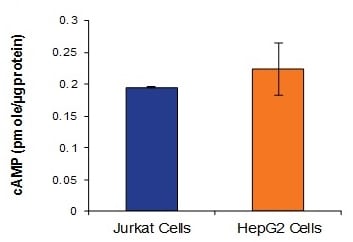cAMP Assay Kit (Competitive ELISA) (ab65355)
Key features and details
- Assay type: Quantitative
- Detection method: Colorimetric
- Platform: Microplate reader
- Assay time: 3 hr 30 min
- Sample type: Cell culture media, Cell Lysate, Other biological fluids, Serum, Tissue Extracts, Urine
- Sensitivity: 0.002 µM
Overview
-
Product name
cAMP Assay Kit (Competitive ELISA)
See all cAMP kits -
Detection method
Colorimetric -
Sample type
Urine, Serum, Other biological fluids, Tissue Extracts, Cell Lysate, Cell culture media -
Assay type
Quantitative -
Sensitivity
> 0.002 µM -
Range
0.002 µM - 0.2 µM -
Assay time
3h 30m -
Species reactivity
Reacts with: Mammals, Other species -
Product overview
cAMP Assay Kit ab65355 uses a sensitive colorimetric competitive ELISA method to quantify cAMP (cyclic AMP) levels in samples from mammals and other species. It has a sensitivity of 0.002 µM.
The cAMP assay protocol uses a 96-well plate supplied coated with Protein G. The Protein G binds an anti-cAMP antibody which is added to the plate.
HRP-labeled cAMP, and free cAMP within a sample, are then added to each well of the plate. The cAMP assay is based on the competition between the HRP-labeled cAMP and the free cAMP for the fixed number of cAMP antibody binding sites on the plate.
The more free cAMP is present, the less HRP-labeled cAMP is bound. After a washing step, the amount of bound HRP-labeled cAMP is detected using a colorimetric HRP substrate measured by absorbance at OD 450 nm. The level of signal is compared to a standard curve for free cAMP, which is run at the same time as the samples.
This kit uses an acetylation step to achieve the maximum sensitivity.
cAMP assay protocol summary:
- add prepared samples and standards to tubes
- add neutralizing buffer
- add acetylating reagent mix, vortex and incubate for 10 min at room temp
- add assay buffer
- transfer to protein-G 96-well plate
- add cAMP antibody and incubate for 1 hr at room temp
- add cAMP-HRP and incubate for 1 hr at room temp
- wash with assay buffer
- add HRP developer and incubate for 1 hr at room temp
- stop reaction with HCl
- analyze with microplate reader -
Notes
This product is manufactured by BioVision, an Abcam company and was previously called K371 cAMP Direct Immunoassay Kit (Colorimetric). K371-100 is the same size as the 100 test size of ab65355.
If you are using fluorometric detection, we recommend cAMP Assay Kit (Fluorometric) (ab138880).
-
Platform
Microplate reader
Properties
-
Storage instructions
Store at -20°C. Please refer to protocols. -
Components 100 tests Acetylating Reagent A 1 x 750µl Acetylating Reagent B 1 x 1.5ml Assay Buffer XXXVI 1 x 25ml cAMP Standard 1 x 10µl cAMP-HRP 1 vial Neutralization Buffer III 1 x 7.5ml Protein G Coated Plate 1 unit Rabbit Anti-cAMP Ab 1 vial TMB Substrate I 1 x 10ml -
Research areas
-
Relevance
Adenosine 3’,5’-cyclic monophosphate (cyclic AMP, cAMP) is an important “second messenger” involved in many physiological processes. It plays a key role as an intracellular second messenger for transduction events that follow a number of extracellular signals. -
Alternative names
- Adenosine 3' 5' cyclic monophosphate
- Adenosine 3’ 5’ cyclic monophosphate
- Cyclic adenosine monophosphate
- Cyclic AMP
Associated products
-
Assay kits
-
Related Products
- 8-(4-Chlorophenylthio)adenosine 3',5'-cyclic monophosphate (8-CPT-cAMP), Cell permeable cAMP analog. (ab120424)
- Adenosine 3prime,5prime-cyclic monophosphate (cAMP), Second messenger. PKA activator. (ab120493)
- 8-Br-cAMP (8-Bromo-cAMP), PKA activator (ab141448)
- RHC-80267, diacylglycerol lipase inhibitor (ab141758)
- 10kD Spin Column (ab93349)
Images
-
 Functional Studies - cAMP Assay Kit (Competitive ELISA) (ab65355)Jiang, Qiufen et al., Scientific reports vol. 4 6963., Fig 4, doi:10.1038/srep06963
Functional Studies - cAMP Assay Kit (Competitive ELISA) (ab65355)Jiang, Qiufen et al., Scientific reports vol. 4 6963., Fig 4, doi:10.1038/srep06963Concentration of cAMP in response to in vitro haemocyte stimulation with LPS and β-AR (B) agonist/antagonist at 24h. Data presented as mean ± S.D. (N = 6) of cAMP concentration expressed as pmol µL-1. The significant differences among the control and treatedgroups were subjected to one-way ANOVA, followed by Student-Newman-Keuls multiple range test, which revealed two groups (a to b). The concentration of cAMP with the same letter in common do not differ at the P = 0.05 level of significance.
-
Measurement of cAMP in Jurkat and HepG2 cells with ab65355. Assay performed using the kit protocol.
-
Standard curve (colorimetric): mean of duplicates (+/-SD)
Datasheets and documents
-
SDS download
-
Datasheet download
References (83)
ab65355 has been referenced in 83 publications.
- Mohammed I et al. A Novel Homozygous MC2R Variant Leading to Type-1 Familial Glucocorticoid Deficiency. J Endocr Soc 6:bvac058 (2022). PubMed: 35506146
- Ruiz de Martín Esteban S et al. Cannabinoid CB2 Receptors Modulate Microglia Function and Amyloid Dynamics in a Mouse Model of Alzheimer's Disease. Front Pharmacol 13:841766 (2022). PubMed: 35645832
- Ibrahim SSA et al. Anti-neoplastic action of Cimetidine/Vitamin C on histamine and the PI3K/AKT/mTOR pathway in Ehrlich breast cancer. Sci Rep 12:11514 (2022). PubMed: 35798765
- Martínez-Rojas B et al. NPC transplantation rescues sci-driven cAMP/EPAC2 alterations, leading to neuroprotection and microglial modulation. Cell Mol Life Sci 79:455 (2022). PubMed: 35904607
- Chaffin AT et al. FGF21 controls hepatic lipid metabolism via sex-dependent interorgan crosstalk. JCI Insight 7:N/A (2022). PubMed: 35998055



